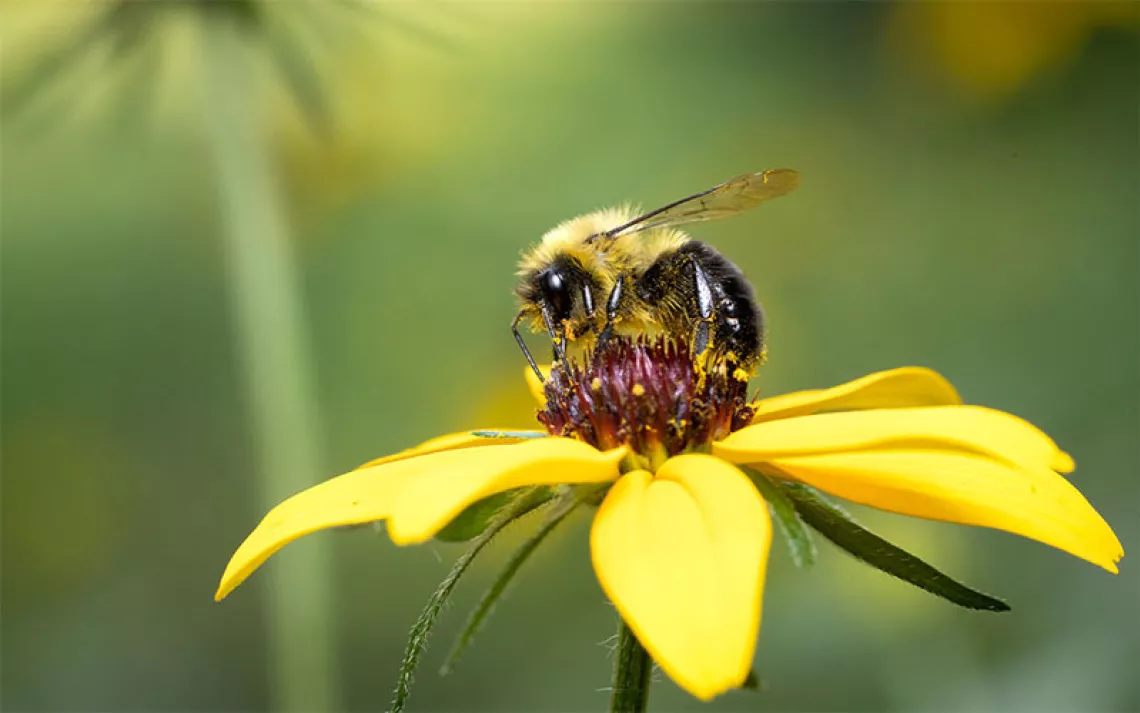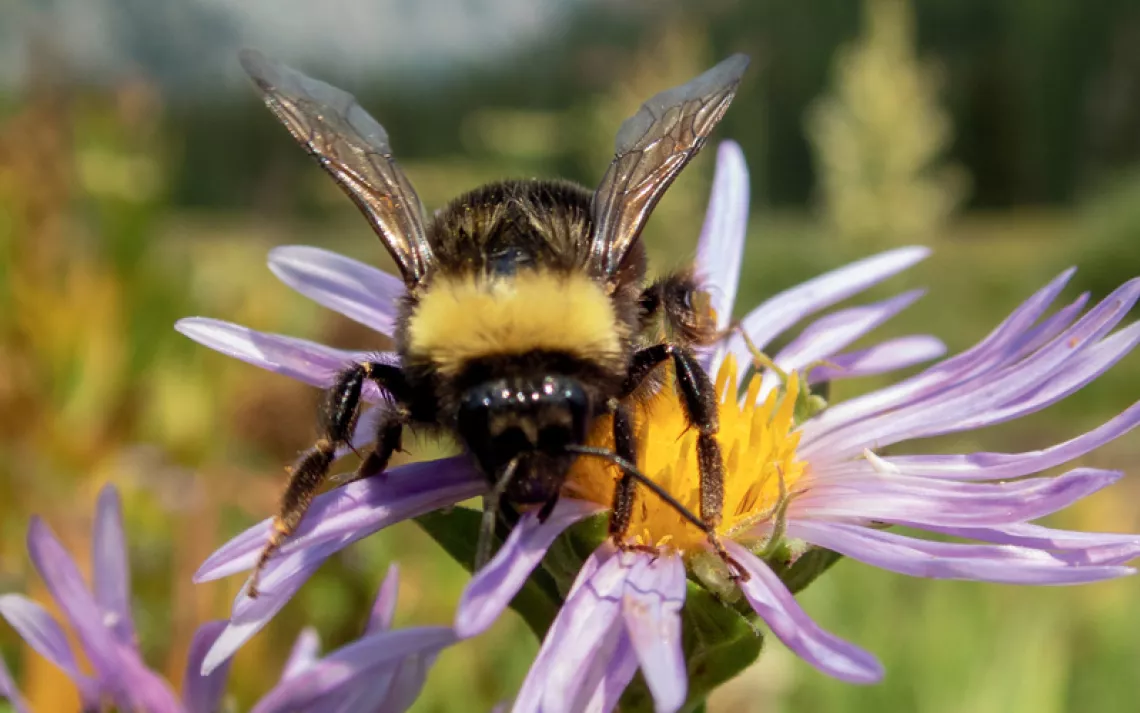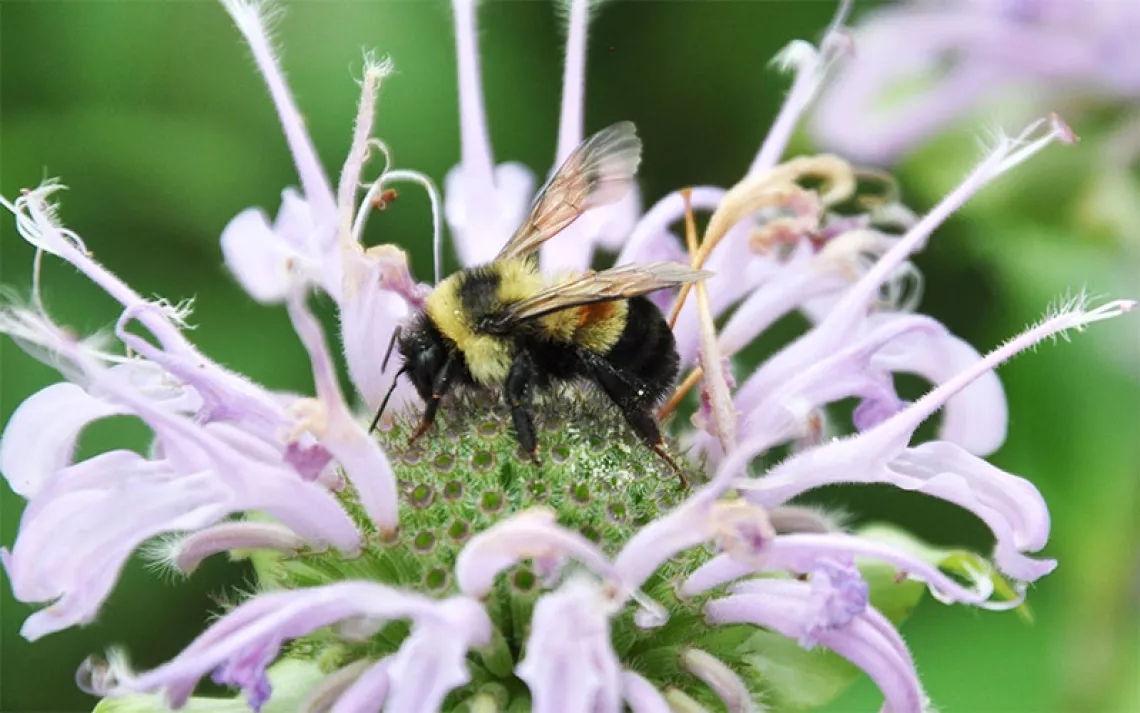14 Pollinator-Friendly Colleges That Have Us Buzzing
Bee Campus USA–certified schools bring bees to higher education

A bee on SUNY Cortland’s campus | Photo courtesy of SUNY Cortland
While several colleges strive to attract prospective applicants with postcard-perfect grounds featuring manicured lawns and twisting ivy, many are adapting their landscaping practices to more effectively attract bees, butterflies, and their pollinating brethren. Bee Campus USA, an outgrowth of the Bee City USA program, was founded in 2015 to encourage such a shift.
“What we’re looking for is a total paradigm change in the way schools think about ornamental landscaping,” says Phyllis Stiles, founder and director of the Bee City and Bee Campus USA programs.
After forming a leadership committee comprised of faculty, administrative staff, and students, colleges can apply to become certified Bee Campuses through the program’s website. If accepted, the schools agree to seven commitments, which include developing a habitat plan, hosting awareness events, and reporting annually on their pollination accomplishments. While the president of any school is required to sign off on the application, Stiles says, the true key to a successful Bee Campus is to recruit the grounds department. “That’s the most important thing.”
Some colleges, Stiles notes, are daunted by the idea of establishing infrastructure for bee colonies; however, beekeeping (while encouraged) is not required for designation. Others worry that Bee Campus status will deter applicants who harbor bee fears or allergies. But as the problem of pollinator decline becomes more pervasive, Stiles says, the stigma surrounding bees is slowly dying. “Most people see the bigger picture.”
A diverse assortment of schools—rural and urban, big and small, medical and agricultural—have earned the Bee Campus certification. “We never know which campus is going to contact us, and we are always amazed,” Stiles says. The range and number of applicants is only likely to increase, as Bee Campus USA recently announced its partnership with the Xerces Society for Invertebrate Conservation, the largest pollinator protection organization in the world.
Though the program is only a few years old, there are currently 46 Bee Campuses in 26 states across the country. Here are 14 schools whose standout pollinator programs have us buzzing.
1. Southern Oregon University: As the original Bee Campus, Southern Oregon University had to set the bar for future applicants. The environmental science department has long taken advantage of the campus’s spot at the foothills of the Siskiyou Mountains, one of the most biodiverse areas in the world. “The professors that teach the environmental science classes are super engaged in the campus and building community at SOU around environmental sustainability,” says Michael Oxendine, landscape superintendent. Besides the fact that the campus boasts more than a dozen pollinator gardens, professors have taken students out to create bee habitats for the campus farm and to collect native flower seeds to sow the in arboretum. “Students are really tied to the landscapes and habitats, and they are always coming back and checking on their projects,” Oxendine says.
2. Georgia Institute of Technology: When Georgia Tech applied to be the second Bee Campus, it was already an established school. Take the Urban Honey Bee Project, an undergraduate research and education program focused on the impact of urban habitats on honeybees. Since receiving Bee Campus designation, the university has started a number of unique projects that combine its focus on science and technology with a commitment to pollinators. In Bee-Snap, an interdisciplinary class offered every spring, students develop technological tools to address pollinator problems, such as game-style apps through which users can collect data about bee-flower interactions and GIS plots of optimal bee habitat in Atlanta. “We have a pretty interesting hybrid of working with the hard sciences and engineering and computer science,” says Jennifer Leavey, director of the Urban Honey Bee Project. Let’s just say that Georgia Tech is truly honoring its mascot: the yellow jackets.
3. College of San Mateo: The third designated Bee Campus is also the first and only California college bearing the designation. The College of San Mateo’s biology faculty and sustainability committee work closely with groundskeepers to ensure best practices. “The number one thing is that, as part of our facilities planning and maintenance, we always purchase neonicotinoid-free plants as well as native plants whenever possible,” says Paul Hankamp, a biology professor. But perhaps the centerpiece of the pollinator program—and of the campus itself—is the CSM Community Garden honoring Cesar Chavez, famed farm labor leader and civil rights activist. The garden is filled with native plants like white sage, which are used both by pollinators for sustenance and student cultural groups for ceremonies. “We really brought in a lot of different learning and cultural communities,” says Hankamp. “It’s not just the scientists!”
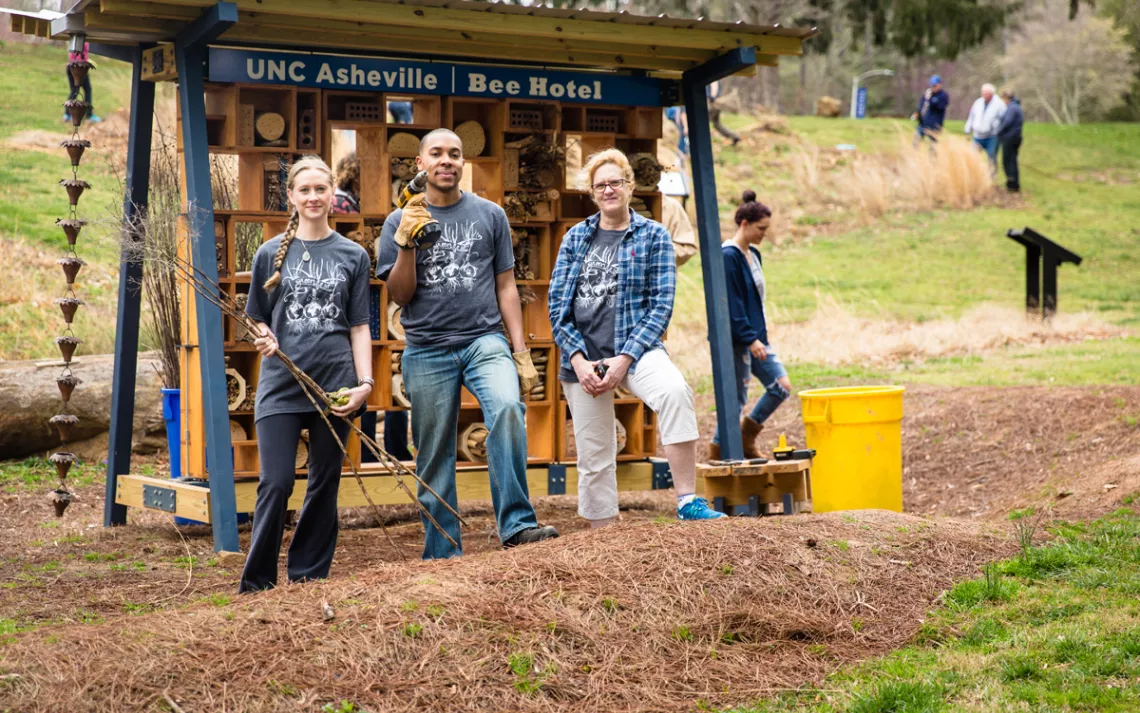
Bee Hotel stewards at UNC Asheville's Bee Hotel (campus volunteers regularly clean it out and restock nesting supplies) | Photo courtesy of the Xerces Society
4. University of North Carolina, Asheville: Nearly every nook and cranny of the University of North Carolina, Asheville’s campus has been filled with native plants, bee hotels, and edible landscaping—and that’s just the way the UNCA community likes it. “One thing campus does more of now is redefine what a beautiful college campus is, so it’s not just English ivy and large expanses of lawn and neatly trimmed hedges,” says Jacqueline Hamstead, campus environmental specialist. “It’s still beautiful and maintained, but it’s a little bit wilder of a look, and we’ve done a good job of encouraging the campus community to take pride in that.” Here, professors collaborate closely with the grounds department to use the campus as an “outdoor laboratory” for pollinator-related classes (which include a humanities course called Honeybees and Humans for the less scientifically inclined) and student research projects. Students are also involved with pollinator-oriented community outreach programs and guided tours of the Bee Hotel. The library staff even created a Pollinator Seed Library to sell to the Asheville community, to help local pollinator-friendly habitats proliferate.
5. Medical University of South Carolina: Even though the Medical University of South Carolina is primarily a hospital campus, its holistic approach to health made it a perfect candidate for the Bee Campus program. “One of the things you have to think about is how to grow food in an ecologically sustainable manner, and for that you need bees,” says Carmen Ketron, farm educator at the campus’s urban farm. The university boasts 41 acres of flowering plants and landscaping to encourage medical students to be active and take refuge from high-stress hospital settings. The campus also uses its community garden as a teaching tool, offering open educational workshops to students, faculty, staff, and the surrounding community. Many such workshops focus on how to cohabitate with pollinators, especially in light of the fear surrounding bee-sting allergies. “If anyone calls in with a complaint about a bee, we send someone who is educated in identifying bees to say what kind it is,” Ketron says. “Then we’ll make a decision about whether we want to remove or relocate the nest or put out informational signage.”
6. University of North Texas: Don’t let the goofy videos fool you—University of North Texas is serious about its Bee Campus designation. The first Bee Campus in the sprawling state of Texas has pollinator-friendly plants in its community gardens, vegetable garden, and natural dye garden, which is managed and utilized by students in the art department. Just off the main campus lies a four-acre “pollinative prairie” where ecology department students and staff work to replace invasive grasses with native plants and flowers to restore the grassland prairie habitat. At the annual EarthFest, the campus community can learn more about and celebrate the pro-pollinator efforts. “We are very focused on sustainability here, and we’re always looking for more ways to get involved,” says Maggie Brookshire, community garden facilitator at the University of North Texas. “After all, our school’s motto is ‘we mean green.’”
7. Coastal Bend College: A Bee Campus in a Bee City named Beeville may seem too serendipitous to be true, but Coastal Bend College checks all those boxes and more. The school worked with the town of Beeville, Texas, to get both the campus and its surrounding landscapes certified with pollinator-friendly bonafides. “We’re a rural community, so a lot of people have close ties to the land,” says Mark Seccord, dean of academics. The joint commitment to pollinator-friendly practices in this southern Texas small town lends itself to a number of exciting and educational community events. At Beeville’s annual Springfest, the college hosts workshops for children to teach the upcoming generation about the role pollinators play in our daily lives and how we can manage ourselves and our habitat more responsibly. Last year during National Pollinator Week, Coastal Bend College launched its first annual Bee Jamboree, a special farmers' market with live music, tours of the college’s pollinator conservation garden, beekeeping presentations, and a Busy Bee walking trail.

Students catch and identify pollinators at one of three wilderness research and education facilities operated by SUNY Cortland. | Photo courtesy of SUNY Cortland
8. State University of New York (SUNY) College at Cortland: While many college community gardens tend to be planted on the outskirts of campus, SUNY Cortland’s garden and bioswale are located front and center. “Students pass them all the time,” says Beth Klein, campus sustainability coordinator. According to Klein, there are 26 native, pollinator-friendly plant species on campus, and the university’s grounds team uses the least toxic integrative pest management program to ensure the health and longevity of both pollinators and plants. “We’re trying to model what people should be doing to help the environment,” says Klein. “Becoming a Bee Campus just fit with that model.” This summer, the garden committee plans to install a small orchard, and they are working on creating an edible forest garden as an expansion. The pro-pollinator efforts even extend to the university’s outdoor education areas, which are left relatively untouched for the sake of biodiversity.
9. University of Connecticut, Storrs: This campus already had extensive bee-friendly programming in place before earning Bee Campus designation in 2017, including an entire minor for integrated pest management. But over the past few semesters, student pollinator activists have worked to set up service learning projects for students, create a pollinator-friendly garden at the off-campus student farm, host outreach events like a “pollinator protection panel” with expert “bee whisperers,” and conduct educational programs with local elementary schools. “The students behind the cause were extremely enthusiastic from the get-go, so they really got everyone else excited,” says Sophie Macdonald, sustainability intern at the office of environmental policy.
10. University of Missouri, Columbia: The University of Missouri Columbia hosts regular day camps for the local Boys and Girls Club, 4-H clubs, and science teachers at the area’s public schools during which participants are given a crash course in pollinator issues. Campers report to the on-campus A.L. Gustin Golf Course, where between-tee areas boast natural plantings, a monarch waystation, beehives, and the university’s butterfly garden. It recently opened the program for students on campus as well. “We have a very strong college of agricultural, food, and natural resources,” says Karlan Seville, communications manager. “We’re all in for the pollinators.” Students have also had the opportunity to take alternative spring break service trips to the Spikenard Farm Honeybee Sanctuary in Virginia to learn more about pollinator preservation. The University of Missouri Columbia’s Bee Campus designation has also stoked competitive (or, perhaps, collaborative) spirit among its athletic rivals in the Southeastern Conference (SEC). “When we became a Bee Campus, we started getting a lot of phone calls from other SEC schools about Bee Campus USA,” says Seville. “That was kind of fun to be recognized in that way.”
11. Auburn University: Alabama’s Auburn University was one of the first schools to jump on the SEC Bee Campus bandwagon. Each year, the university invites more than 700 guests for a Beekeeping Symposium, and the university’s GIS lab is mapping gardens around campus to determine which plants are most attractive to pollinators. The Office of Sustainability also hosts an annual picnic in August to promote sustainable practices; according to Geoffrey Williams, assistant professor in the department of agricultural studies, this year’s will highlight the Bee Campus program and related coursework. Williams hopes the Bee Campus certification will help the school document and unify all existing programs in order to fill any gaps in pollinator knowledge. “There is a diverse group of individuals on campus that are interested in this so we can come at it from all different angles,” he says. “We are in a unique position to be leaders in Alabama.”
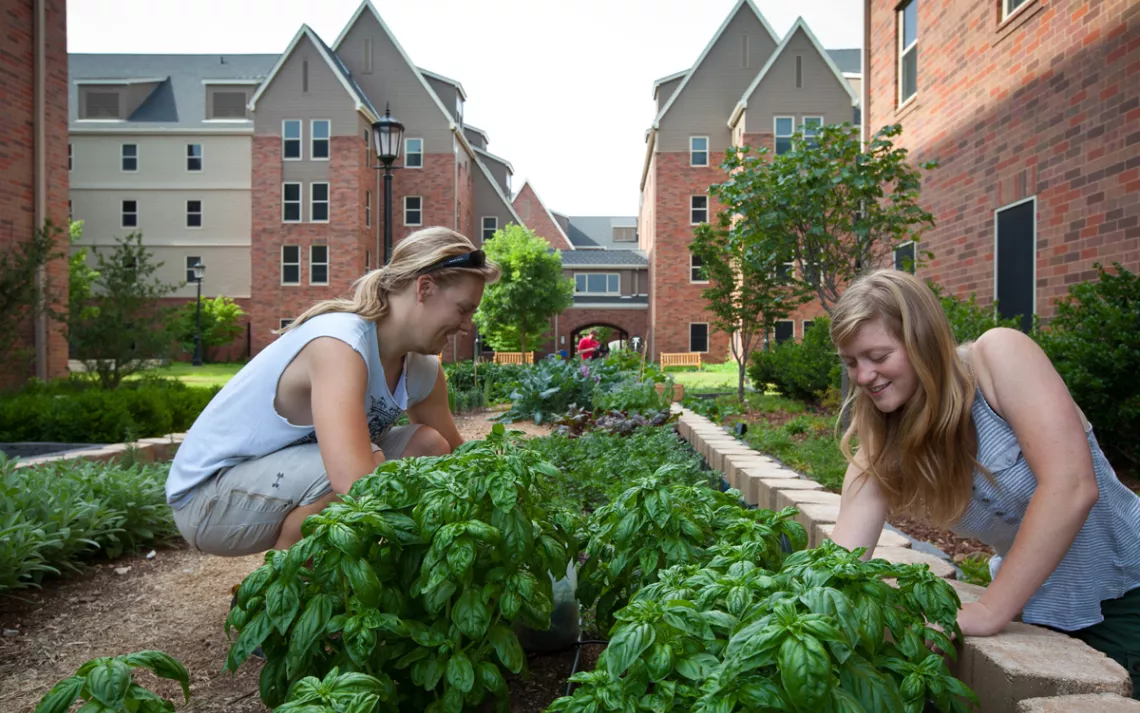
Students tend community gardens between residence halls at the University of Arkansas, Fayetteville. | Photo courtesy of Eric Boles
12. University of Arkansas, Fayetteville: Many students are drawn to the University of Arkansas, Fayetteville, for its outdoor recreation opportunities in the surrounding Ozark Mountains. Eric Boles, director of the Office of Sustainability, believes that students who are attracted to mountain biking, climbing, and rafting also develop an appreciation for the local ecosystems. The outdoor-oriented campus culture has encouraged the school’s green roofs projects, dedicated native plant lists (for campus landscaping purposes), and efforts to reduce pesticide and herbicide use. The school is also working on turning the social trails in the wooded areas around campus into a sustainable plant system framed by native, pollinator-friendly flora. “We’re an urban campus that has a lot of open green spaces,” says Boles. “It’s an opportunity to take some of those green spaces and create a bee sanctuary in a larger city, and lead by example.”
13. Central Community College Grand Island: Shortly after it earned the Bee Campus certification in May 2017, Central Community College Grand Island also won a grant from the Nebraska Statewide Arboretum to further bolster its pollinator programs. The community college was already known locally for its professional beekeeping course, but the new influx of funds and prestige allowed it to expand the conversation beyond honeybees. In October 2017, the school unveiled a pollinator garden boasting more than 6,000 square feet of native shrubs, grasses, perennials, and groundcovers—all carefully selected to withstand the extremes of Nebraska’s seasons without being watered. “I like to say we’re the pollinator flyway of the central United States, an island oasis in a field of commodity crops of corn and soybeans,” says Benjamin Newton, environmental sustainability director. This month, Central Community College’s student pollinator enthusiasts will take to the Nebraska State Fair to present their projects in the sustainability pavilion. In the future, they hope to apply for certification of the school’s campuses in Columbus, Nebraska, and Hastings, Nebraska, as well.
14. The University of Central Florida: This university is the most recently designated Bee Campus, the only one in Florida, and the largest of all the Bee Campuses. Its 1,415 acres in subtropical Orlando support a total student body of 66,180 and a wealth of native pollinator habitats. “There are only a few other campuses I know of where their academics and facilities sides work together so closely,” says Patrick Bohlen, director of landscape and natural resources. The university's arboretum collaborated with the landscape and natural resources department to plant the campus’s first pollinator gardens in 2016; they have since added another near the humanities and fine arts building. Horticultural staffers monitor the plants to determine which species thrive best on campus. Last year, the university added three honeybee hives to its arboretum, and with the recent certification, the Bee Campus committee has energy to do much more. “People are open to new ideas here,” says Bohlen. “Sustainability is a topic that students are very concerned about, so this is a good fit for us.”
 The Magazine of The Sierra Club
The Magazine of The Sierra Club
